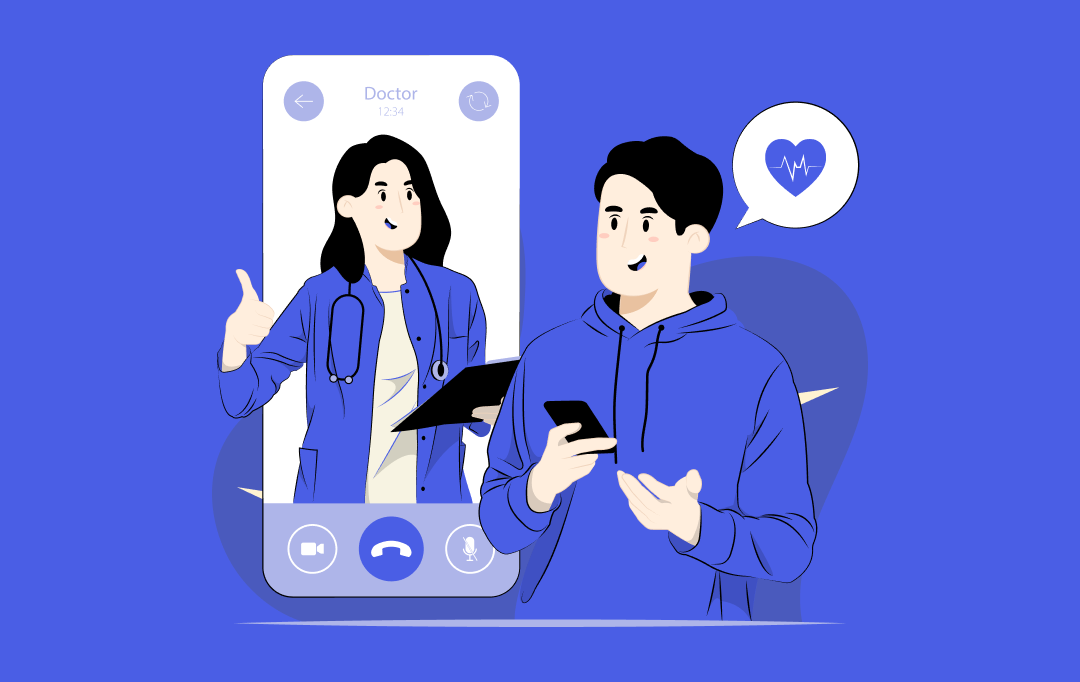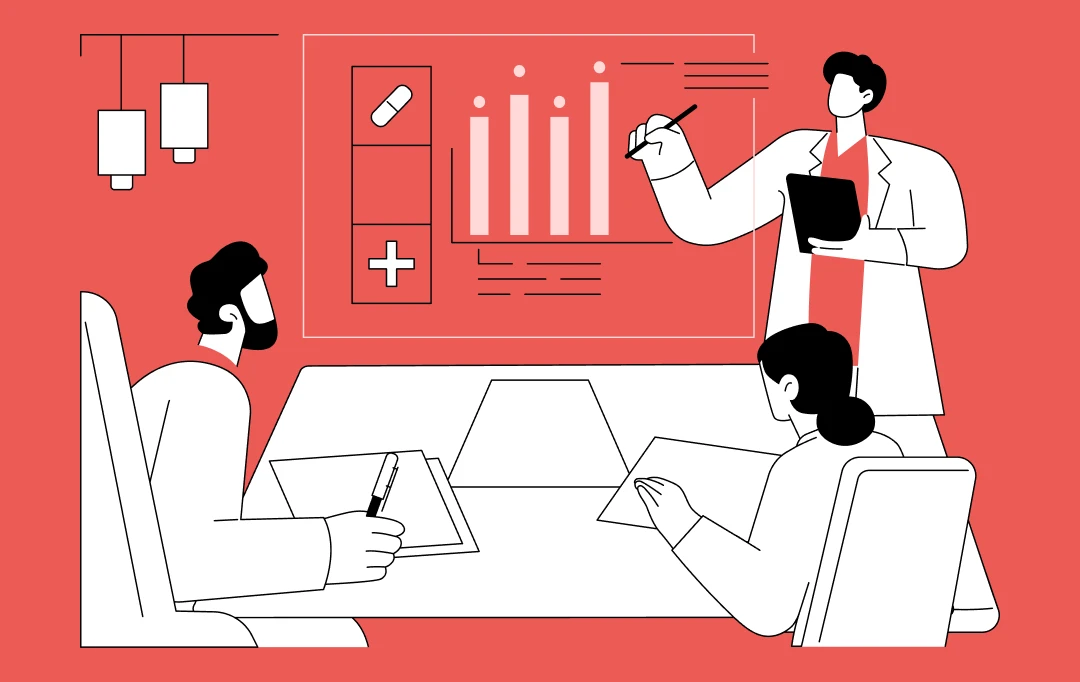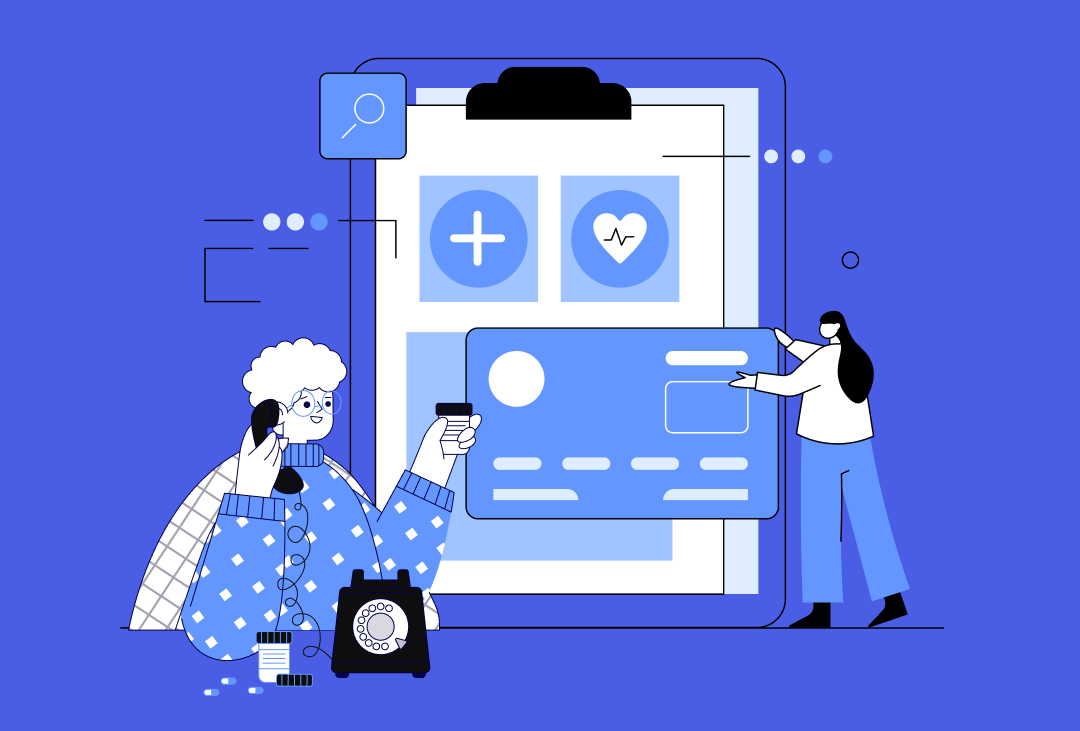- How Does Natural Language Processing in Healthcare Work?
- Top 10 Use Cases of NLP in Healthcare
- Speech Recognition
- Predictive Analytics
- Sentiment Analysis
- Drug Discovery
- Medical Coding and Billing
- Clinical Trial Management
- Health Information Retrieval
- AI Chatbots
- Clinical Documentation Management
- Personalized Treatment Recommendations
- Key Areas in Healthcare Where NLP is Driving Transformation
- Pharmaceutical
- Healthcare Management
- Disease Diagnosis
- Biotechnology
- Telemedicine
- Game-Changing Benefits of NLP in Healthcare
- Increasing Patient Health Awareness
- Enhanced Data Accuracy
- Improved Patient Engagement
- Identify Patients with Critical Care Needs
- Improve Care Quality
- How to Use NLP in Healthcare: Challenges and Solutions
- Data Quality
- Legacy Healthcare Systems
- Compliance Management
- Unlock the Full Potential of NLP in Healthcare with Appinventiv
- FAQs
Healthcare systems are bombarded with vast amounts of data — from electronic health records (EHRs) to medical imaging—much of which remains unstructured and difficult to leverage. With estimates suggesting that up to 80% of healthcare data is unstructured, there is a critical need for technologies that can convert this data into valuable insights, helping medical professionals and pharmacists make informed decisions.
It is where healthcare Natural Language Processing (NLP) steps in, enabling the extraction and organization of unstructured information from disparate data formats Like scans, PDFs, and text. However, NLP
According to MarketsAndMarkets, the global NLP market in healthcare will expand from $2.7 billion in 2023 to a projected $11.8 billion by 2028. This growth trend is anticipated to skyrocket as an increasing number of medical organizations adopt NLP for healthcare management.
So, how is NLP used in healthcare, and how is the technology revolutionizing the industry? This blog discusses this all and showcases the potential of natural language processing in healthcare to streamline workflows and improve patient care.
So, without further ado, let’s uncover how NLP in healthcare is shaping the future of the medical world through its diverse applications and advantages.
How Does Natural Language Processing in Healthcare Work?
Natural Language Processing in healthcare works by converting complex and unstructured medical text into understandable data. When healthcare documents are put into an NLP system, the technology analyzes and deciphers not just the words but their context and meaning and generates relevant output.
For instance, NLP algorithms differentiate between various elements in a document, such as distinguishing between patient names and medical conditions and identifying whether the information pertains to single or multiple patients.
After interpreting the text, NLP uses AI and ML techniques to extract and organize relevant information. It segments data accurately, formats it for integration into EHR, and automates data entry by mapping clinical details like patient IDs, symptoms, and prescriptions to the correct fields.
Let’s understand the working mechanisms of NLP in healthcare through a flow chart.

For instance, Appinventiv developed DiabeticU, a diabetes management app that uses NLP to enhance diabetes management by analyzing patient data and extracting key information from medical records and patient inputs. NLP helps the app accurately segment and format data, such as blood sugar levels and medication adherence, for integration into a comprehensive management system. This reduces manual data entry and improves the accuracy of the information used for patient care.

Top 10 Use Cases of NLP in Healthcare
Natural Language Processing in healthcare transforms the industry with innovative applications that enhance patient care, streamline operations, and drive medical advancements. Below are the top 10 NLP healthcare use cases, showcasing how the technology impacts the medical domain:

Speech Recognition
Ever wonder how clinicians manage to document everything they see and hear during consultations? NLP-powered speech recognition tools or virtual scribes listen in on patient consultations, accurately transcribing conversations in real-time. This eases the documentation burden and allows doctors to focus on patient care without the distraction of manual note-taking.
For example, Nuance’s Dragon Medical One is a cloud-based speech recognition tool that assists medical staff in documenting patient information in EHRs.
You may like reading: Cost of developing an AI Voice and TTS app like Speechify
Predictive Analytics
Imagine being able to foresee potential health issues before they become critical. NLP sifts through historical patient data and trends to predict outcomes and potential disease outbreaks, helping healthcare providers stay a step ahead.
For instance, Veteran Health Administration Centers used NLP to find patients who might face complications after surgery. The study showed that NLP was better at identifying these at-risk patients than traditional methods.
Related Article: 10 Uses Cases of Predictive Analytics in Healthcare
Sentiment Analysis
Understanding patient feelings and feedback can be challenging. NLP analyzes patient reviews and social media comments to gauge sentiments, helping healthcare providers improve services and patient satisfaction.
Drug Discovery
Discovering new drugs is a complex process. However, you can simplify this process with the use of NLP in healthcare. How? NLP analyzes vast amounts of scientific research and clinical data. It helps identify potential new drugs and accelerates the development process.
Also Read: The Potential of AI in Drug Discovery and its Impact on Healthcare
Medical Coding and Billing
Medical coding is a critical yet time-consuming task that directly impacts billing and reimbursements. But worry not! NLP-driven Computer-Aided Coding (CAC) systems analyze clinical documents and automatically generate the appropriate codes. This reduces the manual effort and errors while speeding up the billing process, ensuring healthcare providers receive timely and accurate payments.
An example of NLP in healthcare projects is CAC, a 3M 360 Encompass System. Supported by over 150 coding experts, it helps coders analyze patient documentation and provide auto-suggested tags and review tools.

Clinical Trial Management
Studies show that about 80% of clinical trials face delays or terminations, and around 85% fail to recruit enough participants. Medical NLP addresses these challenges by scanning patients’ medical data to identify eligible trial candidates more efficiently. Additionally, NLP speeds up the review and analysis of trial data and scientific literature, helping researchers quickly identify promising drug candidates and streamline the trial process.
Health Information Retrieval
Finding the right information in a sea of medical records can be overwhelming. It is where NLP-driven tools fit in, helping healthcare professionals quickly locate the most pertinent information at their fingertips and facilitating more informed decision-making.
For instance, platforms like SyTrue’s NLP Operating System allow doctors to easily interact with medical records, eliminating the need to search for key details and enabling them to focus more on patient care.
AI Chatbots
NLP for healthcare enables patients to interact with AI chatbots that understand and respond to their queries, schedule appointments, or even provide basic medical advice. These NLP-powered chatbots and virtual assistants improve patient engagement and streamline administrative tasks.
For example, Google’s AMIE (Automated Medical Intelligence Engine) is an advanced AI chatbot that excels at these functions, demonstrating the potential of NLP-powered tools in enhancing patient care and healthcare efficiency.
Clinical Documentation Management
Clinical notes often contain valuable insights that are difficult to access. NLP technology in healthcare automates the extraction and organization of these notes, improving the quality and completeness of EHRs and enhancing overall patient care.
Personalized Treatment Recommendations
NLP analyzes patient data, including medical history and genetic information, to provide personalized treatment recommendations. By extracting and synthesizing insights from various sources, NLP helps medical professionals tailor treatments to every patient profile, improving more targeted and effective care.
Key Areas in Healthcare Where NLP is Driving Transformation
Natural language processing in healthcare redefines multiple areas with its diverse applications. Here are some of the most notable areas where NLP technologies are driving transformation

Pharmaceutical
NLP’s advanced text analysis capabilities empower pharmaceutical companies to efficiently sift through clinical notes, research papers, and patient records. This not only accelerates drug discovery and development but also ensures compliance with regulatory standards.
Healthcare Management
For healthcare providers, NLP offers a powerful tool to optimize patient record management. By integrating NLP algorithms, hospitals can automate the updating of EHRs, interpret test results, generate comprehensive reports, and support clinical decision-making.
Disease Diagnosis
NLP is making strides in medical imaging. It assists in the analysis of X-rays and other scans, helping doctors identify potential abnormalities more swiftly. This technology enhances diagnostic accuracy, leading to quicker interventions and improved patient outcomes.
Also Read: AI in Medical Diagnosis: Enhancing Accuracy and Efficiency
Biotechnology
In biotechnology, NLP is invaluable for mining vast amounts of text-based data. Researchers can use NLP to quickly extract relevant information from public databases and clinical trials, reducing the time needed for data analysis and thus speeding up research timelines.
Bonus Read: Learn How Biotech Firms Use AI in Biotechnology
Telemedicine
Telemedicine is leveraging NLP to improve patient interactions and streamline initial consultations. AI-powered chatbots equipped with NLP capabilities can handle preliminary patient questioning, gather essential medical data, and prepare records for further review by healthcare professionals.
Game-Changing Benefits of NLP in Healthcare
The potential of NLP in the healthcare and life sciences market continues to expand with each technological advancement. Each new development unlocks a range of advantages that enhance various aspects of healthcare delivery. Here are some key benefits of NLP in healthcare:

Increasing Patient Health Awareness
NLP-powered tools process, analyze, and summarize vast amounts of medical information, making it easier for patients to understand their health conditions and treatment options. This increased clarity and awareness helps patients make more informed decisions about their care.
Enhanced Data Accuracy
By converting unstructured data into structured formats, NLP enhances the precision of patient records. It helps minimize errors in medical documentation and ensures that healthcare professionals have reliable information at their fingertips.
Improved Patient Engagement
With NLP-driven chatbots and virtual assistants, patients receive relevant and real-time responses to their inquiries. This keeps patients engaged and improves their experience with healthcare services.
Identify Patients with Critical Care Needs
NLP can sift through vast volumes of patient records to determine who has urgent or critical care needs. This allows healthcare providers to prioritize and respond immediately, ensuring that critical patients receive the prompt attention they require.
Improve Care Quality
NLP for healthcare enhances care quality by simplifying data management and ensuring accurate documentation. This supports more informed clinical decisions and personalized treatment plans, improving patient outcomes and care.
How to Use NLP in Healthcare: Challenges and Solutions
While the future of NLP in healthcare is promising, overcoming the challenges of the technology is crucial to unlocking its full potential and gaining impactful benefits.

Data Quality
Challenge: NLP systems rely on high-quality, accurate data to provide valuable insights. Healthcare data is often filled with specialized jargon and terminology, with many words having multiple meanings. This complexity can make text recognition and classification difficult for NLP systems, leading to incorrect decisions or missed opportunities for intervention.
Solution: To address these challenges, it is essential to use good quality, domain-specific datasets for training NLP models.
Legacy Healthcare Systems
Challenge: Many healthcare organizations use outdated systems that are not compatible with advanced NLP models. This can create barriers to implementing NLP technology in healthcare and hinder their potential benefits.
Solution: Upgrading legacy systems or employing middleware solutions that bridge gaps between old and new technologies can facilitate smoother integration of NLP tools.
Compliance Management
Challenge: Healthcare data is subject to strict regulations like HIPAA, which govern privacy and security. NLP systems must adhere to these regulations to avoid legal issues and ensure patient confidentiality.
Solution: Implement strong data encryption, access controls, and regular security audits. It will help maintain adherence to regulatory requirements and protect sensitive information.
You may like reading: A Complete Guide to Healthcare Compliances
Unlock the Full Potential of NLP in Healthcare with Appinventiv
In healthcare, where every second counts and decisions can be life-altering, AI-driven NLP tools and advanced LLMs like ChatGPT can make a big difference. These advanced technologies transform the medical landscape by providing doctors with deep, data-driven insights faster than ever before.
So, are you ready to enhance patient care and operational efficiency with the applications of NLP in healthcare? Partnering with a professional healthcare app development company like Appinventiv is key.
With around a decade of experience and a team of 1,600+ tech specialists, Appinventiv is uniquely equipped to guide you through complex technology integrations. From data processing to intelligent automation, we help you leverage cutting-edge technology to stay ahead in the healthcare industry and improve patient outcomes.
Still unsure about our expertise in developing healthcare solutions with cutting-edge technologies like NLP and Gen AI in healthcare? Well, let’s get a glimpse of our competence in healthcare app development by peeing into some of our case studies.
Soniphi: Appinventiv built Soniphi, which uses advanced voice analysis to assess users’ health and well-being, providing personalized insights and wellness recommendations.
Health-e-People: Our healthcare experts created a comprehensive health assessment platform — Health-e-People, that empowers users to monitor and improve their health through detailed reports and actionable insights.

YouCOMM: We developed YouCOMM, a healthcare app that enables patients to communicate effectively with medical providers using AI-driven gesture recognition. It enhances patient care and interaction in clinical settings.
DiabeticU: Appinventiv developed the DiabeticU — Diabetes Management App that helps patients monitor their blood sugar levels, track their diet, and manage their condition more effectively with personalized guidance.
Don’t wait anymore. Contact us now and see how our healthcare app development services can help you optimize your administrative process and improve patient care — all while meeting regulatory requirements.
FAQs
Q. How to implement NLP in healthcare?
A. Here is a checklist for medical natural language processing implementation:
- Define NLP Use Cases in Healthcare: Identify your goals for the NLP tool and the functionalities you want it to serve. This helps build a custom medical NLP solution tailored to your specific needs.
- Prepare Data: Collect and preprocess data from various healthcare sources to ensure the NLP model has high-quality and relevant information for training and analysis.
- Buy or Build an NLP Model: Personalize a ready-made tool or develop a custom one from scratch based on your defined use cases and objectives.
- Train Your Model: Gather and prepare relevant data to create a training dataset tailored to your specific requirements.
- Ensure Compliance: Verify that your NLP system adheres to healthcare regulations like HIPAA and GDPR, ensuring it meets data protection and security standards.
- Integrate and Deploy: Integrate the NLP solution with your existing healthcare systems and workflows, and deploy it in a controlled environment to assess performance.
- Monitor and Maintain: Continuously monitor and maintain NLP algorithms to stay aligned with evolving healthcare needs, fix errors, and maintain accuracy.
Q. What is NLP in healthcare?
A. NLP healthcare refers to the application of AI technologies that enable computers to understand, interpret, and generate human language in a medical context. This includes analyzing unstructured data from patient records, clinical notes, and research articles to uncover insights, improve patient care, and streamline administrative processes.
By converting complex medical language into actionable data, NLP enhances clinical decision-making, aids in research, and supports operational efficiency across healthcare systems.
Q. How is NLP used in healthcare?
A. There are various ways NLP is used in healthcare. Here are the top 10 uses of natural language processing in healthcare:
- Speech Recognition
- Predictive Analytics
- Sentiment Analysis
- Drug Discovery
- Medical Coding and Billing
- Clinical Trial Management
- Health Information Retrieval
- AI Chatbots
- Clinical Documentation Management
- Personalized Treatment Recommendations
Q. How does NLP help in improving patient care?
A. Healthcare natural language processing significantly improves patient care by extracting valuable, actionable insights from unstructured clinical notes, discharge summaries, and research papers. This allows healthcare providers to quickly identify critical patient information, track disease progression, personalize treatment plans, improve diagnostic accuracy, and monitor public health trends, ultimately leading to more efficient and effective care delivery.
Q. How to ensure data privacy and security in healthcare NLP applications?
A. Ensuring data privacy and security in clinical natural language processing applications is paramount and involves several strategies. This includes anonymization and de-identification of Protected Health Information (PHI) before processing, using secure, HIPAA-compliant cloud environments, implementing robust access controls, employing advanced encryption for data at rest and in transit, and adhering to strict regulatory frameworks like GDPR and HIPAA.
Q. What is the ROI of implementing NLP in a hospital or clinic?
A. The ROI of implementing NLP in a hospital or clinic can be substantial, though it varies based on scale and specific use cases. Key areas of return include reduced administrative burden and operational costs, improved coding and billing accuracy leading to increased revenue, enhanced clinical decision-making, faster research insights, and a reduction in medical errors, all contributing to better patient outcomes and financial efficiency.
Q. How much does it cost to implement NLP in healthcare software?
A. The cost to implement NLP in healthcare software varies widely, ranging from $30,000 to $300,000 or more, depending on several factors.
Contact us to obtain a more precise estimate for the cost of NLP implementation in healthcare.



Why Telehealth Security is Non-Negotiable for Patient Trust and How to Achieve It
Key takeaways: Telehealth security is crucial for patient trust and the continued adoption of digital healthcare services. The rising tide of cyber threats, from ransomware to inadequate authentication, poses significant risks to patient data and provider reputation. Implementing robust security measures like end-to-end encryption, multi-factor authentication, and regular audits is non-negotiable. Compliance with regulations like…

10 Ways Healthcare Providers Are Using Patient Analytics to Enhance Care Plans and Optimize Outcomes
Imagine a world where doctors don’t just react to health crises, but predict and prevent them before they happen. This is the reality with patient analytics for healthcare providers. The healthcare industry is no longer limited to treating symptoms—it’s now about understanding patterns, making smarter decisions, and delivering care that’s truly personalized. And it’s not…

Exploring the Role of Personalization in Healthcare through Technology
Key takeaways: Personalization in healthcare transforms patient care from generic, population-based treatments to individualized approaches tailored to each patient's unique needs. Advanced technologies like AI, IoMT, and genomics are the core enablers for tailoring medical treatments. Personalization drives significant benefits, including improved patient outcomes, higher engagement, and reduced costs. The future of healthcare is hyper-individualized,…

















